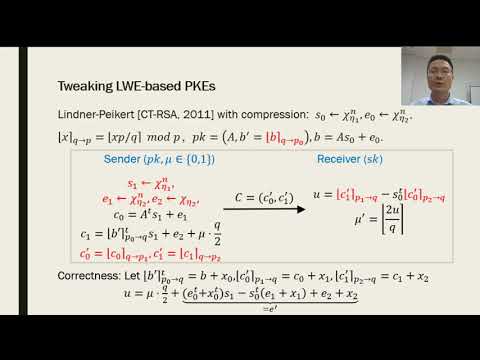Welcome to the resource topic for 2019/510
Title:
Tweaking the Asymmetry of Asymmetric-Key Cryptography on Lattices: KEMs and Signatures of Smaller Sizes
Authors: Jiang Zhang, Yu Yu, Shuqin Fan, Zhenfeng Zhang, Kang Yang
Abstract:Lattice-based cryptosystems are less efficient than their number-theoretic counterparts (based on RSA, discrete logarithm, etc.) in terms of key and ciphertext (signature) sizes. For adequate security the former typically needs thousands of bytes while in contrast the latter only requires at most hundreds of bytes. This significant difference has become one of the main concerns in replacing currently deployed public-key cryptosystems with lattice-based ones. Observing the inherent asymmetries in existing lattice-based cryptosystems, we propose asymmetric variants of the (module-)LWE and (module-)SIS assumptions, which yield further size-optimized KEM and signature schemes than those from standard counterparts. Following the framework of Lindner and Peikert (CT-RSA 2011) and the Crystals-Kyber proposal (EuroS&P 2018), we propose an IND-CCA secure KEM scheme from the hardness of the asymmetric module-LWE (AMLWE), whose asymmetry is fully exploited to obtain shorter public keys and ciphertexts. To target at a 128-bit security, the public key (resp., ciphertext) of our KEM only has 896 bytes (resp., 992 bytes), which gives an improvement of 192 bytes (resp.,160 bytes) over Kyber. Our signature scheme bears most resemblance to and improves upon the Crystals-Dilithium scheme (ToCHES 2018). By making full use of the underlying asymmetric module-LWE and module-SIS assumptions and carefully selecting the parameters, we obtain better compromise between computational costs, storage overheads and security and therefore construct an SUF-CMA secure signature scheme with shorter public keys and signatures. For a 128-bit security, the public key (resp., signature) of our signature scheme only has 1312 bytes (resp., 2445 bytes), which gives an improvement of 160 bytes (resp, 256 bytes) over Dilithium. We adapt the best known attacks and their variants to our AMLWE and AMSIS problems and conduct a comprehensive and thorough analysis of several parameter choices (aiming at different security strengths) and their impacts on the sizes, security and error probability of lattice-based cryptosystems. Our analysis demonstrates that AMLWE and AMSIS problems admit more flexible and size-efficient choices of parameters than the respective standard versions. Furthermore, implementations of our proposed schemes appear to be (slightly) more computationally efficient than their counterparts.
ePrint: https://eprint.iacr.org/2019/510
Talk: https://www.youtube.com/watch?v=Ji6PZ1146aE
See all topics related to this paper.
Feel free to post resources that are related to this paper below.
Example resources include: implementations, explanation materials, talks, slides, links to previous discussions on other websites.
For more information, see the rules for Resource Topics .
